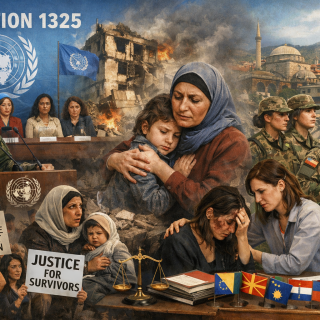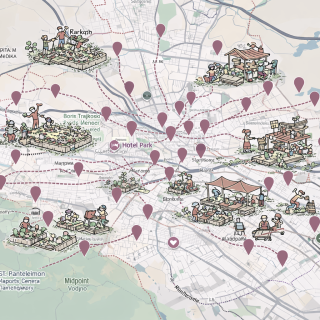In early 2022, the War Crimes Prosecutor’s Office (TRZ) in Serbia indicted four Croatian pilots for their alleged responsibility in air attacks against civilians. Near Kapljuh in Bosnia and Herzegovina, on August 7, 1995, an airstrike on a refugee column killed 10 people, while another airstrike near Svodna in Bosnia on August 8 killed 3 people. A total of 24 people were injured in these attacks over the two days. The indictment sparked sharp reactions, primarily from Croatia but also from Bosnia and Herzegovina. Arguments from Zagreb, coming from the media, academia, and political circles following the indictment, were contradictory. On one hand, they downplayed the nature of the crime, while on the other, they denied that the crimes were committed by Croatian forces. Croatian media reported the indictment by calling the attack alleged, and some called on the government to ignore the indictment. In response to the indictment, President Milanović warned Serbia in the summer of 2022: “Don’t play with fire because it will cost you.”
Part of the academic community in Croatia claimed that the civilian casualties were collateral damage, and that the column itself was a legitimate target, based on the assertion that there were members of the Serbian Army of Krajina (SVK) in the column. Public discourse also mentioned perhaps seemingly forgotten investigations and verdicts of the ICTY, which dominant media, politicians, and academics use selectively, regardless of the country. In the case of the refugee column from Croatia, some referred to the investigations and the acquittal of Ante Gotovina and Mladen Markač, which cited a lack of incriminating evidence against Gotovina and Markač for crimes against civilians related to Operation Storm. This argument is irrelevant since the acquittal did not mention their involvement in the crime. The Prosecutor’s Office of Bosnia and Herzegovina also highlighted the problem of fragmented evidence and the inaccessibility of responsible persons and witnesses, as they live outside Bosnia and Herzegovina.
There is also a notable lack of political courage in addressing the issue of civilian casualties and those responsible for the crimes, regardless of the country. The left does not have a clear stance on the events of the 1990s and seems to form one during elections. For instance, the Serbia Against Violence coalition had to take a stance on Kosovo, and only shortly before the elections in late 2023 did a significant faction within the coalition express opposition to the French-German proposal, which includes the territorial integrity of Kosovo. Regarding the Croatian left, the situation is not much better. The SDP mentioned justice for all victims in their political program and emphasized the importance of normalizing interstate relations with the region, considering the wars of the 1990s. According to the Serbian National Council, which has been organizing a commemoration for civilian victims of Operation Storm for years, all parliamentary groups in the Croatian Parliament are invited to the commemoration each year. However, according to the SNC, no one, including the SDP, has ever attended the SNC’s commemoration. Considering this, why does the SDP claim in their program that they advocate for “justice for all victims” if no one from the SDP has ever attended the commemoration for the victims of Operation Storm? Topics of the 1990s remain exclusively within the domain of more radical political parties on the right side of the spectrum. For example, the Homeland Movement based the majority of their election program on the Homeland War, with key points being the systematic implementation of the dominant war narrative in education, science, culture, veterans’ issues, (lack of) media freedom, and the rights of minority communities, with a particular emphasis on limiting the rights of the Serbian national minority.
The aforementioned trial against Croatian pilots initiated in Belgrade, which, according to the Humanitarian Law Center, initially reached the media but is now unavailable to the public and surrounded by questions and ambiguities. Regardless of whether the indictment is grounded in the principles of responsible implementation of transitional justice processes, it has resulted in media confusion and a barrage of interpretations. According to legal and international legal procedures, the War Crimes Prosecutor’s Office in Serbia submitted the indictment and later the summons to the Ministry of Justice of the Republic of Serbia so that these legal documents could be delivered to the Ministry of Justice and Administration of the Republic of Croatia. If the summons reached the Ministry in Croatia and it does not act on the matter, Serbia has the right to continue the trial against the pilots in absentia. The Ministry of Justice of the Republic of Croatia issued a statement claiming that it had not received the indictment from Serbia or any other relevant information regarding actions taken in the criminal proceedings. Thus, the hearing scheduled for late 2022 was postponed, and a new one has not yet been scheduled as all necessary elements for the continuation of the proceedings have not been gathered. It is uncertain when they will be available, given the lack of transparency regarding whether relevant Serbian institutions are pressuring Croatia to act on this issue. Considering all the procedural noise from both sides, there is justified suspicion that Croatia may not have received the trial summons, just as there is suspicion that Serbia actually sent the disputed summons.
Civilian victims and families of the victims from the refugee column, irrespective of the mentioned process from Serbia, are in a legal deadlock. Neither in Croatia nor in Serbia do the victims of the columns have the right to reparation because the injury occurred outside the territorial borders of those states. According to the Law on Civilian Victims of the Homeland War, casualties in Bosnia and Herzegovina are not considered part of the Homeland War, and therefore the civilian victim is not entitled to the status of a civilian casualty. The same law is additionally problematic when it comes to requests for family disability benefits by family members of the deceased, which are often rejected due to failing to meet the conditions of Article 5, which states that “members, helpers, or collaborators of enemy military and paramilitary formations who participated in the armed aggression against the Republic of Croatia, and all those who in any other way helped the enemy, as well as their family members,” are not eligible. According to the Law on the Rights of Fighters, Military Invalids, Civilian Invalids of War, and Members of Their Families in the Republic of Serbia, only citizens of the Republic of Serbia who were injured on the territory of the Republic of Serbia are considered civilian war victims. The situation is almost identical in Bosnia and Herzegovina – according to the Law on Protection of Civilian Victims of War in the Federation of Bosnia and Herzegovina, foreign citizens also do not have the right to reparations. Given the legal regulations of all three countries, these victims are entirely outside any state care. Under the influence of non-transparent legal-administrative information and fragmented data about the judicial process, the victims themselves are sidelined in this text as well. This was not only due to personal limitations or lack of resources but also due to internal frustration caused by political, judicial, and administrative obstacles that continuously disrupted and diverted attention from seeking answers while creating new doubts. From an ethical perspective, the trial against the pilots in Serbia seems more like an attempt to bring justice to the Republic of Serbia rather than to the victims themselves, given that Serbian civilian victims without Serbian citizenship do not have the right to the status of civilian victims in Serbia. Criticism must also be directed at Croatia, whose law on civilian casualties complicates the realization of the right to civilian victim status for civilians of the Serbian national minority.
Croatia must also responsibly respond to legal summonses and statements so that Serbia can prosecute the accused, as it has failed to do so for 29 years, not just for the two years since the indictment was issued. In conclusion, civilian victims of war crimes, regardless of their ethnic or national status, should not be forgotten or marginalized due to political, administrative, and legal obstacles. The victims of the refugee column must not be no one’s victims.
Dora Tomljanović (1998) is a graduated historian employed at the Youth Initiative for Human Rights – Croatia. She is the co-author of the one-minute film “Moment of Silence” on the 30th anniversary of the crimes in Ahmići and Trusina, which was in the official selection for the Grand Prix at the 31st Croatian One Minute Film Festival. She is an external associate at the H-Alter portal. In her free time, she engages in music and photography.
Progress Report of Serge Brammertz, Prosecutor of the International Residual Mechanism for Criminal Tribunals
Report on the war crimes trials in Serbia during 2023
Translated by Luna Đorđević




